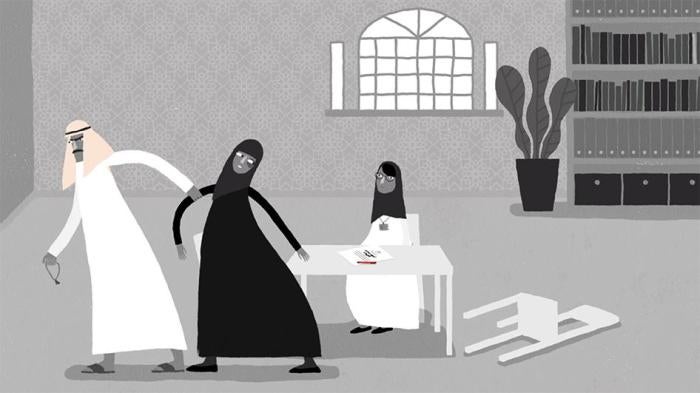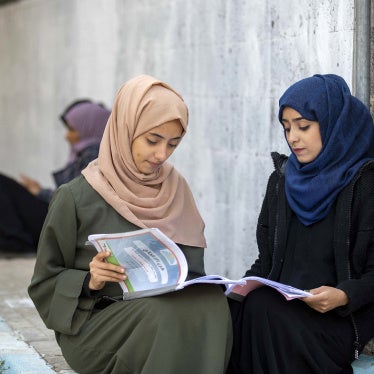Remarks of Sarah Leah Whitson, Executive Director, Human Rights Watch Middle East and North Africa Division
Thank you to the Lantos Commission for organizing this briefing on women’s human rights defenders in Saudi Arabia.
It is now almost one year that the Saudi Arabian government detained approximately 15 women’s human rights defenders immediately prior to the lifting of the driving ban in June 2018. What should have been heralded as an important reform measure to address the legally prescribed subjugation and discrimination of women in Saudi Arabia – no doubt the most extreme in all of the Middle East and North Africa – became instead a fresh declaration of the government’s absolutism: only Saudi Arabia’s unelected leaders would decide what changes would be made in the Kingdom, and they would severely punish any citizens who dared to advocate for those very same changes. So the arrest of the men and women who had advocated for many years to lift the driving ban against women, end the archaic “guardianship” system over women, and allow women to vote in elections for the toothless municipal councils – all things the government has now done or said it will do – must be seen in the context of an absolutist monarchy for whom there is nothing more threatening than the free voices of its citizens calling for reform.
The arrests and persecution of Saudi women’s rights defenders didn’t start under the present King Salman and the de facto ruler, his son the Crown Prince Mohamed bin Salman – and you will hear more, for example, about the ongoing detention of Raif Badawi since 2012 under the prior King -- but they have escalated and reached a scale of magnitude and brutality we have never before documented in the Kingdom.
I want to first name the activists detained in these mass arrests because having their names shared here in a congressional briefing is our own declaration to them that we are fighting against their unjust persecution and stand in solidarity with them: Loujain al-Hathloul, Aziza al-Yousef, Eman al-Nafjan, Nouf Abdelaziz, Mayaa al-Zahrani, Hatoon al-Fassi, Samar Badawi, who is the sister of Raif Badaw and remains detained without any charge at alli, Nassema al-Sadah, Shaden al-Onaizi, and Amal al-Harbi. Other rights groups have identified additional women detainees, including Abeer Namankani and Nouf al-Dosari. They also included men, including lawyer Ibrahim al-Modaimeegh, activist Mohammad al-Rabea, and businessman Abdulaziz al-Mashal. These are some of the brightest lights of Saudi Arabia, the courageous men and women who have fought for the values we universally hold dear, for the benefit of all their fellow citizens.
We have documented very serious allegations of extreme torture of several of the women activists, including beatings, whippings, and electric shocks; one has tried to commit suicide as a result. Loujain al-Hathloul, most recently recognized by Time Magazine as one of the 100 most influential people in the world, described to her family when they came to meet her how she was beaten, waterboarded, given electric shocks, sexually harassed and threatened with rape and murder. Writing about Loujain for Time, I described her as a “model of Saudi womanhood” for her brave struggle for women’s rights, at great personal cost.
It is important to note that two of the women said that Saud al-Qahtani oversaw their torture. In case his name does not ring a bell, let me remind you that the notorious Mr. Qahtani was apparently the Crown Prince’s brutal enforcer; he was also implicated in overseeing the kidnapping, murder and dismemberment of Jamal Khashoggi last year, as well as the surveillance and threats against several Saudi activists living abroad. He’s apparently still roaming free in the Kingdom, with no accountability.
It might not surprise you that the Saudi government has absolved itself of all responsibility for torturing the detained women with two “investigations” by the government-controlled Human Rights Commission and the public prosecutor, which reports directly to the royal court. The Public Prosecution spokesperson confirmed this on March 1 when he told local media that investigations into the torture claims found no evidence to support them.
Meanwhile, government-aligned media outlets have carried out an alarming campaign against them, branding them “traitors,” though the charges against them include absurd allegations of “applying for a job at the UN” and talking to foreign media and human rights organizations; this is what they’ve offered as “evidence” of their undertaking what the Prosecutor described as “coordinated and organized activities… that aim to undermine the Kingdom’s security, stability, and national unity.” Contrary to statements by the Crown Prince, the charges against the activists appear to be nearly all related to their peaceful human rights work. The government has temporarily released several of the women as their trial proceeds, but three on trial remain detained, and two are in detention without charge. The court hearing the central cases against most of the activists postponed its verdicts on both April 17 and April 24; we now expect the final rulings in June after Ramadan.
There are several Congressional pieces of legislation that propose important measures of accountability, including targeted sanctions on Saudi Arabian government officials complicit in the murder of Jamal Khashoggi, as well as war crimes and other serious violations of the laws of war in Yemen. Congress can and should ensure any bill that becomes law also includes accountability for the persecution of women’s rights activists. There is one bill, the Saudi Arabia Human Rights and Accountability Act, HR 2037, introduced by Rep. Tom Malinowski, my former colleague and now a congressman from New Jersey’s 7th district, which does address the persecution of women, and it is well worth supporting. Whether these bills will be enforced given the current political climate, where our President has made clear that he prioritizes economic gains from arms sales above any abuse by the Kingdom’s leaders, no matter how heinous, remains a question. But that’s not a reason for Congress to refrain from action.
What’s just as important is for the executive branch – namely the White House – to recognize that its words and statements assuring the Kingdom that there will, in fact, be no consequence for their abuses, that indeed this administration will stand by them no matter how lawless and sadistic their actions, play an important role in encouraging abuses to continue. The very minimum the Trump administration can do is to stop its “vice-signaling”, if it can’t bear to virtue signal. We hear assurances that they have privately told the Saudis that they should release these activists, if for no other reason than the damage their conduct continues to cause their reputation and undermines their other agenda items in the region; clearly the Saudis are not listening. And so if nothing else, this administration should recognize how unreliable, reckless, and un-strategic the government of Saudi Arabia remains, unable to restrain itself from even the most unnecessary and self-harming outrages. Without consequence, we can expect to see unrepentant and emboldened abuses by this Saudi government.









